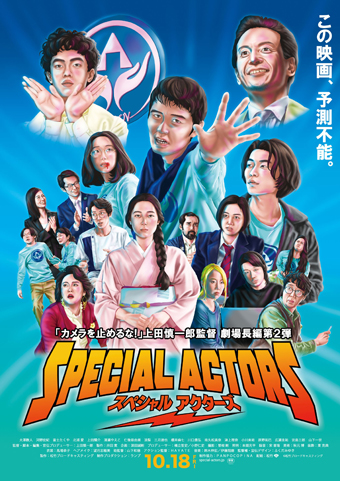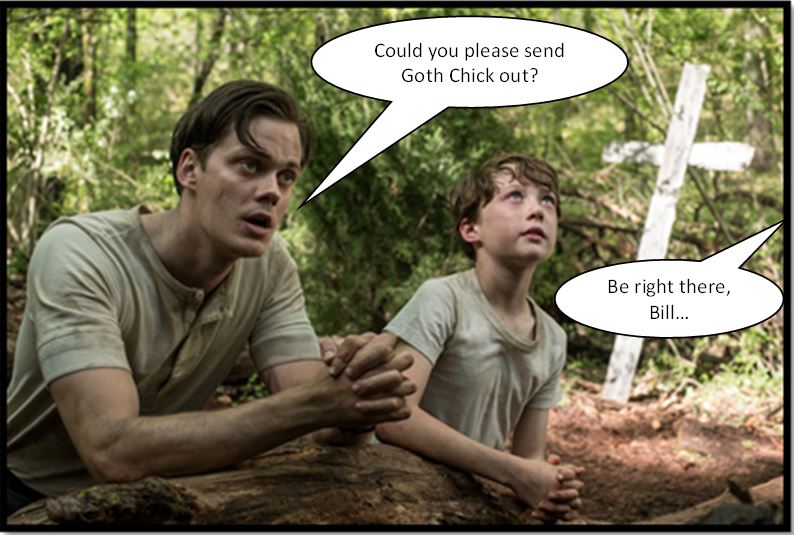Fantasia 2020, Part III: Special Actors
 My first scheduled film at Fantasia 2020 was Special Actors (Supesharu Akutâzu, スペシャルアクターズ), written and directed by Shinichiro Ueda. I loved Ueda’s previous film, 2018’s One Cut of the Dead (Kamera wo tomeruna!, カメラを止めるな!), and this is his first solo feature since; he co-directed 2019’s Aesop’s Game (Isoppu no Omou Tsubo, イソップの思うツボ), and this year posted a special short film follow-up to One Cut on YouTube. Special Actors turned out to be very different from One Cut while still dealing with themes of storytelling and acting and family — and doing something as structurally surprising as One Cut in a completely different way.
My first scheduled film at Fantasia 2020 was Special Actors (Supesharu Akutâzu, スペシャルアクターズ), written and directed by Shinichiro Ueda. I loved Ueda’s previous film, 2018’s One Cut of the Dead (Kamera wo tomeruna!, カメラを止めるな!), and this is his first solo feature since; he co-directed 2019’s Aesop’s Game (Isoppu no Omou Tsubo, イソップの思うツボ), and this year posted a special short film follow-up to One Cut on YouTube. Special Actors turned out to be very different from One Cut while still dealing with themes of storytelling and acting and family — and doing something as structurally surprising as One Cut in a completely different way.
Kazuto (Kazuto Osawa) is a failing actor with a medical condition that causes him to faint when nervous; a lucky encounter with his brother Hiroki (Hiroki Kono), who he hasn’t seen for years, leads him to join Hiroki’s acting company, Special Actors. Rather than perform onstage, the Special Actors play roles in real life: they can be hired as extra mourners at a funeral, or to sit in the audience at the premier of a comic movie and laugh wildly. They will also do more elaborate things, like stage a fight with a guy so he can look tough in front of a girl he wants to impress, or pretend to be the new lover of a woman trying to break up with her abusive boyfriend.
In other words, the Special Actors stage scenarios to help people live their lives. They’re a troupe of weirdos complete with acting coach and scriptwriter, and despite his self-doubts Kazuto fits right in. Then a young woman, Miyu (Yumi Ogawa), comes to the Actors with a tricky request: her sister has joined a cult, who are working on getting her to turn over the family inn. Can the Special Actors expose the cult’s lies and save the inn?
The answer to that question of course involves a series of wild schemes, and schemes inside schemes. Yet this movie avoids frantic zaniness in favour of a constant but relaxed pace. There’s some mugging, but nothing extreme. Jokes come quickly, and build to appropriately chaotic scenes; still, as a whole the film’s anything but manic. There’s a kind of humanity to it that counterbalances the contrivances of the plot and its various twists and contortions.
 Most of the movies I want to see at Fantasia 2020 play at a scheduled time, but quite a few are available on demand for the next two weeks. One of those struck me as a good place to start this year’s unusual Fantasia-from-home: Justin McConnell’s documentary Clapboard Jungle. It’s about the process of putting a film together, focussing not so much on the technical details of directing but the much longer struggle to find financing.
Most of the movies I want to see at Fantasia 2020 play at a scheduled time, but quite a few are available on demand for the next two weeks. One of those struck me as a good place to start this year’s unusual Fantasia-from-home: Justin McConnell’s documentary Clapboard Jungle. It’s about the process of putting a film together, focussing not so much on the technical details of directing but the much longer struggle to find financing. 
 Usually by this point in the year I’ve begun posting reviews of films I saw earlier in the summer at Montreal’s Fantasia International Film Festival. Here as elsewhere, things are different in 2020. When the coronavirus pandemic hit, Fantasia was postponed to the end of August. It looked like this year’s Festival was in danger of not happening at all. But the wonderful and dedicated people behind Fantasia have made it work;
Usually by this point in the year I’ve begun posting reviews of films I saw earlier in the summer at Montreal’s Fantasia International Film Festival. Here as elsewhere, things are different in 2020. When the coronavirus pandemic hit, Fantasia was postponed to the end of August. It looked like this year’s Festival was in danger of not happening at all. But the wonderful and dedicated people behind Fantasia have made it work; 




